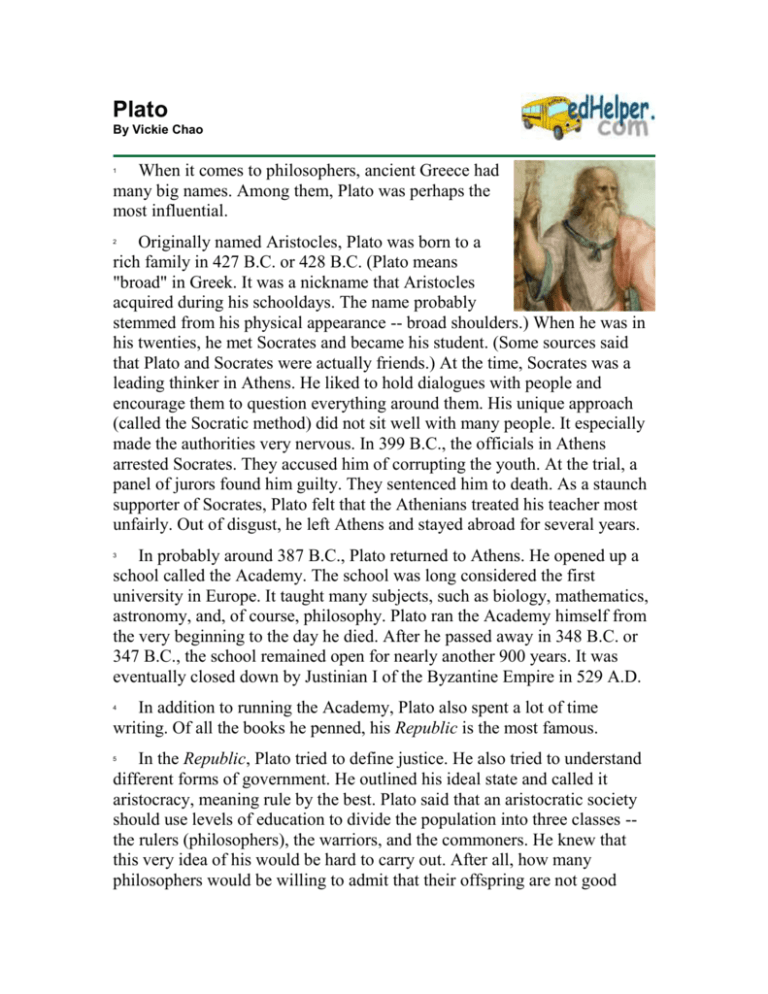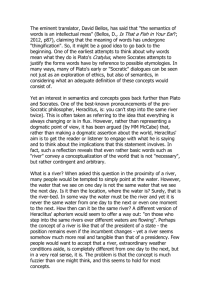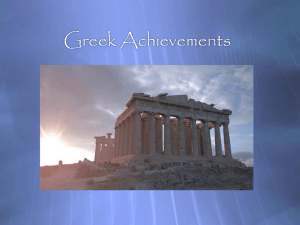Plato
advertisement

Plato By Vickie Chao When it comes to philosophers, ancient Greece had many big names. Among them, Plato was perhaps the most influential. 1 Originally named Aristocles, Plato was born to a rich family in 427 B.C. or 428 B.C. (Plato means "broad" in Greek. It was a nickname that Aristocles acquired during his schooldays. The name probably stemmed from his physical appearance -- broad shoulders.) When he was in his twenties, he met Socrates and became his student. (Some sources said that Plato and Socrates were actually friends.) At the time, Socrates was a leading thinker in Athens. He liked to hold dialogues with people and encourage them to question everything around them. His unique approach (called the Socratic method) did not sit well with many people. It especially made the authorities very nervous. In 399 B.C., the officials in Athens arrested Socrates. They accused him of corrupting the youth. At the trial, a panel of jurors found him guilty. They sentenced him to death. As a staunch supporter of Socrates, Plato felt that the Athenians treated his teacher most unfairly. Out of disgust, he left Athens and stayed abroad for several years. 2 In probably around 387 B.C., Plato returned to Athens. He opened up a school called the Academy. The school was long considered the first university in Europe. It taught many subjects, such as biology, mathematics, astronomy, and, of course, philosophy. Plato ran the Academy himself from the very beginning to the day he died. After he passed away in 348 B.C. or 347 B.C., the school remained open for nearly another 900 years. It was eventually closed down by Justinian I of the Byzantine Empire in 529 A.D. 3 In addition to running the Academy, Plato also spent a lot of time writing. Of all the books he penned, his Republic is the most famous. 4 In the Republic, Plato tried to define justice. He also tried to understand different forms of government. He outlined his ideal state and called it aristocracy, meaning rule by the best. Plato said that an aristocratic society should use levels of education to divide the population into three classes -the rulers (philosophers), the warriors, and the commoners. He knew that this very idea of his would be hard to carry out. After all, how many philosophers would be willing to admit that their offspring are not good 5 enough for the ruling class? Once they refuse to let their children take their proper places in the society, the other two classes would stop respecting them. In the end, the warriors would take over. Aristocracy would dissolve into timocracy, meaning rule by people who value honor. When Plato talked about timocracy, he had one particular city-state in mind. He was referring to Sparta, Athens' sworn enemy. Plato believed that timocracy could not last long because those warriors and their children would want to use their military power to make money. Eventually, a handful of wealthy people would gain control of the society and form oligarchy, meaning rule by the rich. But their dominance would diminish over time because the poor -much larger in number -- would overthrow the rich. When that happens, the state would decline yet again to another level, called democracy. Plato explained that democracy is rule by the people. He predicted that this form of government would cause chaos, for the commoners are not fit to manage state affairs. As the country spins out of control, the mass population would want a strong figure to restore law and order. Once a capable individual is able to do so, he would then establish the worst form of government called tyranny. Plato's low opinion of democracy should not come as a surprise to anyone. At his time, Athens was a democratic country in crisis. To make matters worse, the very government of this nation accused his teacher of a crime that he did not even commit. As a result of it, Socrates died. Because Socrates did not believe in writing, he left nothing behind to defend himself after he passed away. Bent on clearing his teacher's name, Plato wrote many books about Socrates. In those books (such as Republic), he often portrayed Socrates making conversation with other people. Sometimes, he had Socrates play a leading part in a dialogue. Other times, he had him take a lesser role. But how many of those conversations had actually taken place? Only Plato could answer that! 6 Copyright © 2013 edHelper Name _____________________________ Date ___________________ Plato 1. Which of the following about Plato is true? He called democracy the 2. What was the name of the school that Plato opened in Athens? The Institute worst form of government. He founded Europe's first university. He was Socrates' teacher. He was sentenced to death in 399 B.C. 3. For how long had Plato's school been open before it closed down? 916 years 142 years 877 years 387 years The Academy The College The University 4. In Plato's opinion, who would be the best ruler? A philosopher The commoners A warrior A rich man 5. What did Plato call his ideal form 6. How did Plato define oligarchy? of government? Democracy Oligarchy Timocracy Aristocracy 7. Who appeared often in Plato's books? Aristotle Socrates Justinian I Confucius Rule by the rich Rule by the people Rule by the people who value honor Rule by the best 8. Which of the following subjects was not taught in Plato's school? Philosophy English Mathematics Astronomy Plato - Answer Key 1 2 3 4 5 6 7 8 He founded Europe's first university. The Academy 916 years A philosopher Aristocracy Rule by the rich Socrates English








